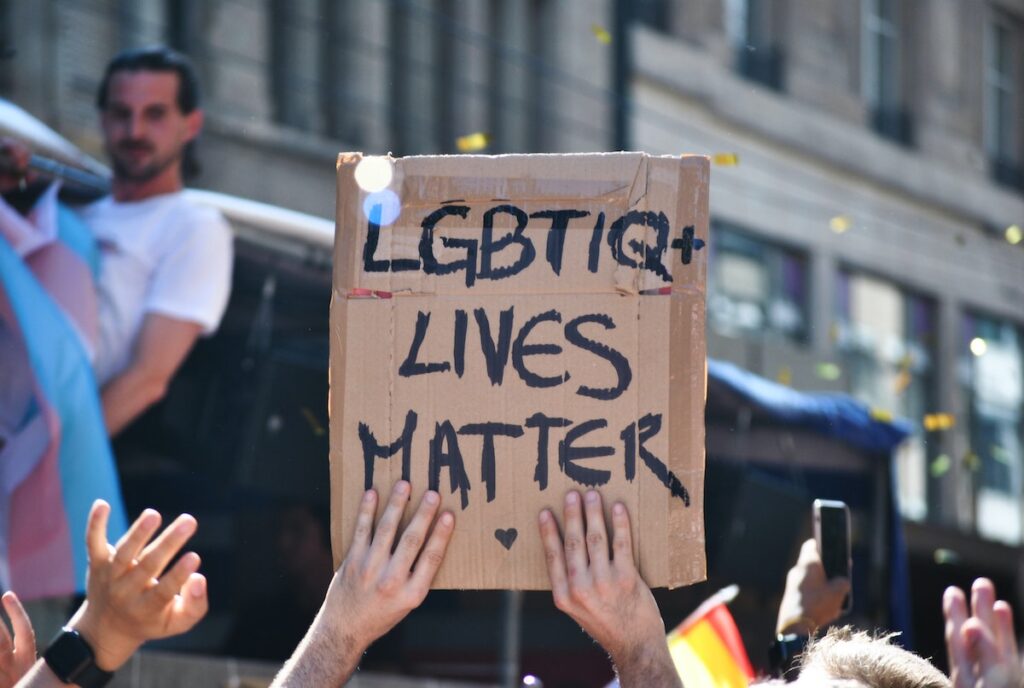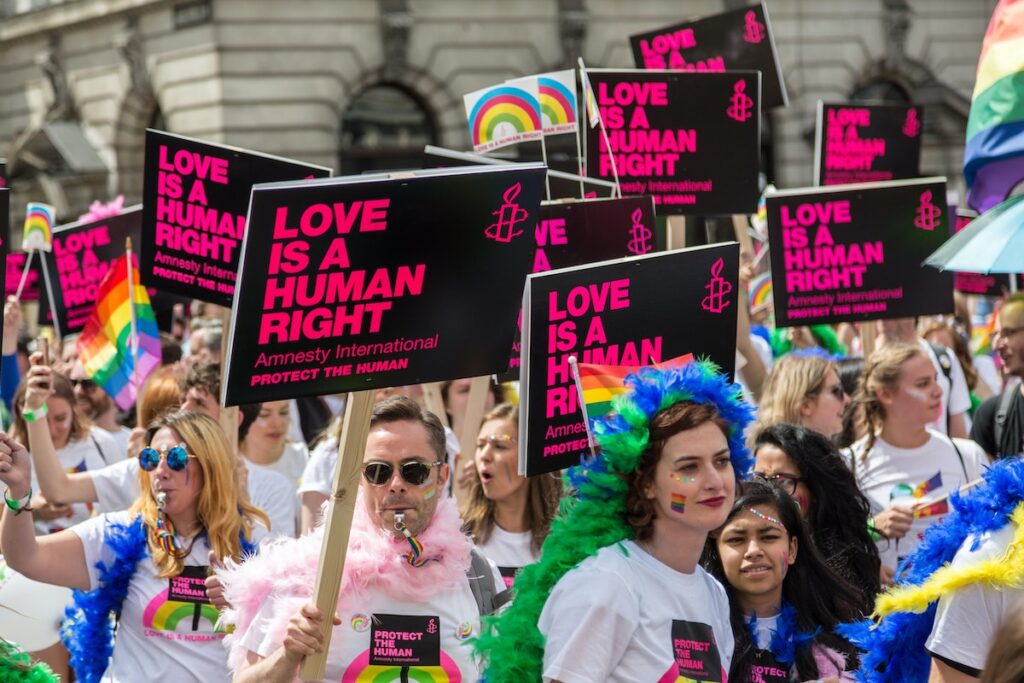
Transgender and gender diverse individuals (TGD) have a gender identity that typically differs from sex assigned at birth. According to research by the Equality and Human Rights Commission, around 1.4% of the UK population are “classified into a gender minority group” (Glen, 2012) and life satisfaction for this group appears to be lower than the general population, with self-reported scores on the Life satisfaction, worthwhile and happiness scale, as low as 5.1 out of 10 (Government Equalities Office, 2017). This picture only gets larger in the United States of America, with a transgender population estimated at around 1.4 million (Flores et al, 2016).
TGD individuals experience minority stress (Meyer, 2003) and this type of stress is related to negative life events such as discrimination, which occurs in a range of areas in life, for instance, people may be unfairly fired from their jobs, rejected by family members or denied service at public accommodations (Grant et al, 2011). Exposure to discrimination has been linked to depression and anxiety (Bockting et al, 2013). A recent study (blogged here by Sarah Carr) has shown that being transgender is significantly associated with the use of current mental health services, current mental health problems, suicide risk and self-harm (Gnan, 2019).
In this paper, Puckett et al. (2019) have set out to extend the existing evidence around the association between discrimination and anxiety and depression symptoms for TGD individuals.
The authors hypothesised that:
- Participants in low-income groups and people of colour would experience higher levels of discrimination compared to other participants
- Higher levels of discrimination would be associated with higher levels of anxiety and depression symptoms.
An exploratory approach was taken with coping variables and analysing the role of coping in relation to discrimination, due to the lack of research in this area.
This paper explores the use of approach‐oriented coping (education and advocacy and resistance), i.e. educating others (Nadal, Davidoff, Davis, & Wong, 2014) or engaging in social activism; and detachment/withdrawal‐oriented coping (drug/alcohol use, detachment, internalisation), such as avoiding certain environments or isolating from others (Mizock & Mueser, 2014).

A recent study has shown that being transgender is significantly associated with the use of current mental health services, current mental health problems, suicide risk and self-harm.
Methods
The data in this study was taken from a broader study with two core components, including keeping a daily diary and a one-time survey; here the authors presented the latter. Participants were invited to take part in the online survey via social media and community organisations.
The survey included a variety of measures including:
- a series of demographic questions,
- a 5-item index of exposure to types of discrimination, where a total score was calculated for items reported as recent exposure (over the past year),
- a 20-item version of the Coping with Discrimination Scale (subscales used were Education & Advocacy, Detachment, Drug & Alcohol use, Resistance and Internalisation),
- a 8-item Patient-Reported Outcomes Measurement Information System (PROMIS) – Depression scale for depression symptoms and
- a 7-item PROMIS – Anxiety scale used to measure anxiety over the past 7 days.
All analyses were conducted using SPSS. Initial descriptive and chi-square analyses were used before conducting multiple mediation analyses and a series of moderation analyses, which were then adjusted for other coping strategies.
The authors ensured the quality of their survey data through various ways, such as the survey platform offering measures to prevented multiple responses by the same user and Consent comprehension questions were used to assess the individuals understanding of the study.
A transgender community advisory board (CAB) of local TGD individuals, were recruited to provide feedback.
Results
A final sample of 695 participants took part, about half identified as transgender men (30.4%) and women (16.6%) and the other half with different gender identities. Most of the participants were White (N=526) and had low annual income (N=357). The authors only included participants with at least 80% of data for each, while missing data ranged from 1.2 to 3%.
Discrimination
- 76.1% of participants reported at least one form of discrimination, with the remaining participants reporting no exposure to discrimination over the past year
- No significant differences were demonstrated between transgender individuals and other gender groups for experience of discrimination over the past year. No significant differences were suggested between racial/ethnic groups for any discrimination items
- A significant difference was highlighted for participants with lower income, who reported more difficulty accessing public restrooms.
Anxiety and depression
- On average, depression and anxiety symptoms for all participants were reported as higher than the general population
- Experiencing more discrimination over the past year was associated with increased anxiety and depression symptoms. The multiple mediation analyses showed a significant association, which remained significant when including coping style mediators.
Coping mechanisms
- A positive association was found between greater past year discrimination and all coping measures, except for drug and alcohol use
- Education and Advocacy was the most used form of coping, followed by internalisation
- Participants who used approach-oriented coping reported less use of detachment/withdrawal-oriented coping and vice versa
- Participants reporting high levels of detachment/withdrawal-oriented coping showed higher levels of anxiety and depression symptoms
- There was no significant association between approach-oriented coping and depression and anxiety symptoms, although high use of these coping strategies still showed an increase in reported depression and anxiety symptoms
- No significant interactions were revealed through the moderation analyses.

Over three-quarters of transgender and gender diverse people in this study reported at least one form of discrimination. On average, depression and anxiety symptoms were self-reported as higher than the general population.
Conclusions
As expected, higher levels of discrimination over the past year were positively correlated with symptoms of anxiety and depression, consistent with previous research. There was an association between greater past year discrimination and all coping measures, except for drug and alcohol use. As individuals encounter greater amounts of discrimination, they engage in a range of coping strategies. The type of coping response is important in understanding the mental health impact of discrimination.
Participants tend to use measures within one type of coping strategy (e.g. approach-oriented only). Although approach-oriented coping was not significantly associated with symptoms, it’s worth considering why there were elevations in symptoms when used frequently.
After accounting for coping, there is still an association between discrimination and depression and anxiety symptoms, which speaks to the importance of social change needed:
It is not enough to promote adaptation in the face of these stressors – the stressors themselves must be addressed.

As trans individuals encounter greater amounts of discrimination, they engage in a range of coping strategies. The type of coping response is important in understanding the mental health impact of discrimination.
Strengths and limitations
Strengths
- This study is extending the research on gender-related discrimination and its effects on individuals. Transgender and gender diverse (TGD) individuals are still at high risk of discrimination in multiple areas of life, such as harassment or being arrested for being TGD (Grant et al, 2011). So it is imperative to learn more about the experiences of these individuals and how to alleviate the suffering
- Coping strategies of TGD individuals has not been widely studied, so this is another important area to research
- The use of the Community Advisory Board was important to keep the study relevant and focused
- The Coping Discrimination Scale had particularly high Cronbach’s Alpha levels for most of the subscales, making it a reliable measure.
Limitations
- This study covers TGD citizens of the United States, so there is a question of generalisability outside of the United States. Not to say that it isn’t still important, as the authors note an increasing concern for the TGD individuals in the United States, following a significant increase in discrimination and victimisation following the 2016 elections (Veldhuis et al, 2018)
- The online sample is not representative of the general population in terms of race/ethnicity, with white individuals being over-represented. Although the authors do note this in their reflections
- There could be a skewed result on the TGD individuals using alcohol and drugs as coping strategies, as the authors note, the participants who took part in the one-time survey, were those who did not meet the criteria for the first part of the broader study, which included alcohol and drug use frequency as a main criteria.

The authors note an increasing concern for the TGD individuals in the US, especially around the discrimination and victimisation following 2016 elections and it is imperative to understand how to alleviate their suffering.
Implications for practice
It is important for a therapist to be aware that what their client is experiencing is not only valid, but the discrimination they experience is a reality. They should acknowledge that their client’s experiences are not an interpretation or over dramatisation, but their social reality. This has implications for the relationship between client and therapist and highlights the importance of a relationship built on good foundations and trust.
These findings also open up an avenue for research into coping strategies as an intervention. There is potential for therapists teaching their clients how to utilise particular coping strategies that could have a positive impact on mental health symptoms (i.e. approach-oriented coping).
My main takeaway from this paper is that more research needs to be done on gender-related discrimination. We know very little about the experiences of minority groups and especially it seems, in regards to coping as a TGD individual. Do coping strategies help? It’s time for more research.

It’s important for therapists to be aware that what their clients are experiencing is not only valid, but the discrimination they experience is a reality. Therapists should acknowledge that their client’s experiences are not an interpretation or over dramatisation, but their social reality.
Statement of interests
None.
Links
Primary paper
Puckett JA, Maroney MR, Wadsworth LP, Mustanski B, Newcomb ME (2019) Coping with discrimination: The insidious effects of gender minority stigma on depression and anxiety in transgender individuals. J Clin Psychol. 2019;1–19.
Other references
Bockting, W. O., Miner, M. H., Swinburne Romine, R. E., Hamilton, A., & Coleman, E. (2013). Stigma, mental health, and resilience in an online sample of the US transgender population. American Journal of Public Health, 103(5), 943–951.
Carr S. Mental health and suicide risk in LGBTQ students: What are the associated factors? The Mental Elf, 20 Jun 2019.
Glen F, Hurrell K. (2012) “Technical note: Measuring Gender Identity” (PDF). Equality and Human Rights Commission. Retrieved 30 May 2019.
Flores, A.R., Herman, J.L., Gates, G.J., & Brown, T.N.T. (2016) How many adults identify as transgender in the united states?The Williams Institute.
(2019) General and LGBTQ-specific factors associated with mental health and suicide risk among LGBTQ students. Journal of Youth Studies. DOI: 10.1080/13676261.2019.1581361
Grant, Jaime M., Motter, Lisa A., Tanis, Justin (2011) Injustice at Every Turn: A Report of the National Transgender Discrimination Survey. National Centre for Transgender Equality and National Gay and Lesbian Task Force 2011 32-158
Meyer, I. H. (2013). Prejudice, social stress, and mental health in lesbian, gay, and bisexual populations: Conceptual issues and research evidence. Psychology of Sexual Orientation and Gender Diversity, 1(S), 3–26.
Mizock, L., & Mueser, K. T. (2014). Employment, mental health, internalized stigma, and coping with transphobia among transgender individuals. Psychology of Sexual Orientation and Gender Diversity, 1(2), 146–158. https://doi.org/10.1037/sgd0000029
Nadal, K. L., Davidoff, K. C., Davis, L. S., & Wong, Y. (2014). Emotional, behavioral, and cognitive reactions to microaggressions: Transgender perspectives. Psychology of Sexual Orientation and Gender Diversity, 1(1), 72–81. https://doi.org/10.1037/sgd0000011
National LGBT Survey: Summary report. Last Accessed: 10 Jul 2020.
Veldhuis, C. B., Drabble, L., Riggle, E. D. B., Wootton, A. R., & Hughes, T. L. (2018). “I Fear for My Safety, but Want to Show Bravery for Others”: Violence and discrimination concerns among transgender and gender‐nonconforming individuals after the 2016 presidential election. Violence and Gender, 5(1), 26–36.
Photo credits
- Photo by Delia Giandeini on Unsplash
- Photo by Stefano Pollio on Unsplash
- Photo by Ian Taylor on Unsplash

Hi! I am a transgender mental health nurse, and this topic covers a significant portion of my dissertation by literature review.
There was one paper I studied in particular that highlighted that examined constructive versus destructive coping mechanisms in transgender service-users exposed to stigma and discrimination, and subsequent effects on mental health – Freese et al (2017): Distinct coping profiles are associated with mental health differences in transgender and gender nonconforming adults.
The findings were that mental health outcomes tended to be poorer in those who engaged in the less optimal coping mechanisms, although the implication was that it was the engagement in those coping mechanisms, as opposed to the content and experience of the stigma and discrimination they experienced, that was highlighted as the reason behind MH difficulties. However, I challenged this assumption, and also discussed other evidence available around these assumptions.
However, as you say, and as I, as well as other researchers have also identified, there is a dearth of literature around these particular subjects. I would be more than happy to link up with you discuss further findings and research!
Hi Roch,
Thank you for your comment!
Sounds like some really interesting findings and it appears to be in line with what Puckett et al were finding.
Please feel free to send me a message on Twitter.